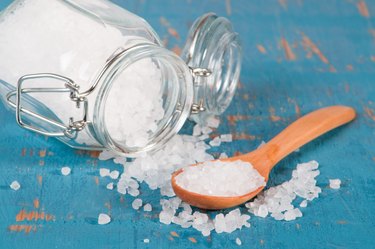
Sodium chloride and calcium chloride are both chloride salts that are added to foods during manufacturing. But, when consumed and digested in the human body, they act very differently. Each salt contains chloride, an electrolyte that plays a role in fluid balance in the body. The difference in the salts is seen in part by the actions of sodium and calcium since these salts are broken down during digestion.
Sodium Chloride in Food
Video of the Day
Sodium chloride, or table salt, has been used in food for thousands of years. This salt provides flavor and is also a natural preservative. Sodium chloride provides no calories, fat, carbohydrates or protein. A single teaspoon provides 2,000 milligrams of sodium. Processed canned, boxed and frozen foods along with cheese, condiments and fast foods usually contain high amounts of sodium. These foods are the greatest sources of dietary sodium for Americans.
Video of the Day
Calcium Chloride in Food
Calcium chloride is substituted for sodium chloride in foods to provide a salty flavor while reducing the foods' sodium content. In food processing, calcium chloride provides a longer shelf life for fruits and vegetables and also tenderizes meat. It also serves many other food-manufacturing purposes, such as neutralizing alkalinity in water and acting as a refrigerant. Calcium chloride does not provide any calories, fat, carbohydrates or protein. But this salt can provide a small amount of dietary calcium, which may help increase overall calcium intake.
Sodium Function in the Body
Sodium is essential for basic body processes. Sodium is an important mineral and electrolyte that helps to regulate water balance in the body. It also helps regulate blood pressure. Sodium is involved in proper nerve and muscle function and nutrient absorption. A sodium deficiency does not usually result from inadequate dietary intake of sodium.
Sodium and Calcium and Your Health
Consuming excess dietary sodium can result health in problems. According to the Linus Pauling Institute at Oregon State University, 75 percent of the dietary sodium you consume comes from salt added during the manufacturing process. Dietary sodium has been linked to gastric cancer, osteoporosis, high blood pressure and kidney stones. Dietary calcium -- such as calcium chloride -- has no health side effects when consumed in normal amounts. Indeed, calcium helps keep your bones strong, plays a role in nerve and muscle function and aids in prevention of osteoporosis. Consuming the mineral above recommended amounts for long periods of time, however, could put you at risk for kidney stones.